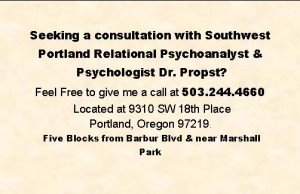Neurotic Organizations and Emotional Health in the Work Place
Emotional Intelligence is the ability to read and understand others by detecting the nuances of their emotional reactions, and to utilize such knowledge to influence others through the wise use of proper emotional communication. It is a critical competency for effective leadership in organizations, including business, government, educational or religious organizations.
Effective work life and high emotional intelligence means good self-esteem, competency in handling conflict, absence of self-sabotage, a clear sense of the other person, and comfort in connecting with others.
Work place difficulties can be aggravated by these relationship patterns:
“I work so hard to smooth over conflict at work that I often do the work of my subordinates. If they don’t follow through, I find it very difficult to confront them. Either I disconnect and change the subject or I am too hesitant. I know this is a problem I have to conquer before I can go further.”
“When I present to a work group, I am afraid I am boring them.”
“I am afraid to hold my work team accountable.”
“My emotions spike when I have to ask someone to change their work habits.”
“My critical boss paralyzes my ability to do my job.”
“I lose my temper with my subordinates when they don’t follow through. I find myself becoming highly critical.”
“I find it difficult to clearly, succinctly, and precisely define tasks for my subordinates.”
Perhaps it isn’t you. Perhaps the difficulty is the work place itself.
Is your job driving you nuts?
How do you deal with a critical boss with poor communication skills?
How do you determine if a work place or corporate culture is Neurotic ? How do you deal with such a culture?
In dealing with work place issues, the emotional education process of interpersonal psychoanalysis can help answer the question as to whether your work places issues arise from either your interpersonal style that you have to change, or whether the problem is within the workplace itself, and not about you. In working with these issues, all the concerns that apply in personal relationships described on this web site are relevant. Individuals with significant work place stress need to learn whether or not the work place itself is neurotic, or whether they themselves need to develop more effective work place communication and work habits. Sometimes, one’s early life patterns may make one blind as to just exactly what is going on in the work place. (Click on the previous sentence for a humorous Dilbert comic on this subject,)
Work relationships are not that different from other relationships. They present us with the same challenges of standing up for ourselves, learning not to lose ourselves to others, avoiding taking the scapegoat role, good awareness of ourselves and others, good self-confidence, clear communication of our subjectivity, and building good networking connections. The difficulty with work relationships, however, is that emotions have to be expressed in a more carefully-nuanced manner. That is because emotions in a work place context are not only for building relationships, but also for accomplishing tasks. In personal relationships, emotions are primarily used to build relationships.
Ten (10) habits of good emotional hygiene in a workplace that require good emotional intelligence:
- If you are a workplace leader or manager, organizational research suggests that you need to combine supportive, clear communications with precise task assignments and descriptions.
- Learn early how to determine if a workplace culture is neurotic or abusive.
- Learn what characteristics are characteristic of abusive or neurotic work places. These include:
- Neurotic work places do not support and reward supportive, positive, affirming, clear communication.
- Neurotic work places do not support clear task assignments.
- Neurotic workplaces actually reward unclear & hostile non-supportive communications and vague unstructured directions, in both relationships and task assignments.
- Understand that in a neurotic work setting, you have only two options, either to attempt to change the reward structure of such an organization, or begin to creatively organize your life to find a more healthy work place setting.
- You must consciously and deliberately evaluate whether your workplace actually rewards the work you find meaningful, and is consistent with your own personal values and identity. If your workplace does not reward what you consider valuable and meaningful, you need to exercise creativity in either attempting to change the reward structures (both financial and emotional) in the organization, or you need to develop the creative courage to leave. (Both Creativity and Courage are needed to leave a work place in which you may have some financial security.)
- Self-awareness is all aspects of your life is crucial to success in organizations and business.
- Leadership decision-making ability is associated negatively with anger, and positively with self-esteem.
- Good leaders are confident in initiating clear structures and outcomes.
- Expressiveness, preciseness, assuredness, inspired meaningfulness and supportiveness are associated with good organizational leadership. Argumentativeness and verbal aggressiveness are not.
- Difficult bosses and work place dysfunction are the two biggest challenges in the work place.
Emotional intelligence about relationships is crucial to sucessful work-place life. Relational or interpersonal psychoanalysis is one proven tool for learning such emotional intellligence.


